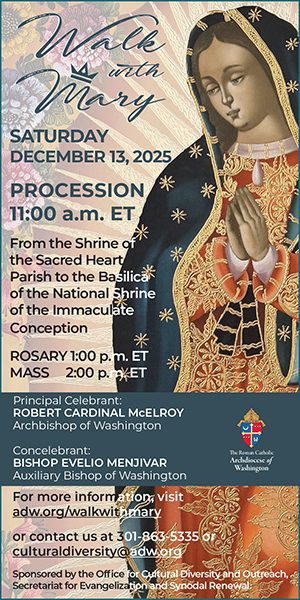WASHINGTON (OSV News) -- Amid growing concern about the impact of the Trump administration's rollback of a policy that prohibited immigration enforcement in sensitive locations, the U.S. Catholic bishops have offered their support to a lawsuit challenging the policy change.
Reports of Immigration and Customs Enforcement agents near St. Jerome Catholic Church in Chicago's Rogers Park neighborhood on Oct. 12 prompted warnings of caution from its pastor, although a spokesperson for ICE denied the church was targeted, NBC Chicago reported. The news outlet reported that neighbors have resorted to forming human chains to help Catholic migrants fearful of ICE go to and leave Sunday Mass so they could worship and receive the sacraments.
In February, more than two dozen Christian and Jewish groups filed a lawsuit in federal court to challenge a Trump administration policy that rescinded long-standing restrictions on ICE agents from making arrests at what are seen as sensitive locations, including houses of worship, schools and hospitals.
The lawsuit, in which Georgetown Law's Institute for Constitutional Advocacy and Protection represented the plaintiffs, argued the new policy sparked fear of ICE raids both in their own congregations and in the populations they serve, lowering attendance at worship services and curtailing their ability to serve the less fortunate.
In April, a judge declined to grant a preliminary injunction to the plaintiffs, but the lawsuit is ongoing.
In September, the U.S. Conference of Catholic Bishops submitted an amicus brief, sometimes called a friend-of-the-court brief, to the U.S. Circuit Court of Appeals for the District of Columbia, to support the plaintiffs' argument that the changes to the policy have put their congregations in an "untenable position."
"They either increase the risk to their congregants of harmful enforcement action by maintaining the obligation to attend weekly services, or limit the provision of in-person religious services to their congregants in response to the imminent threat of an enforcement action, and their congregants' well-founded fears thereof," it said.
Asked for comment, a spokesperson directed OSV News to the text of the amicus brief.
ICE has argued that the policy changes will help them deter criminal activity. In a previous statement about the lawsuit over those changes to OSV News, Tricia McLaughlin, the Department of Homeland Security's assistant secretary for public affairs, said, "We are protecting our schools, places of worship, and Americans who attend by preventing criminal aliens and gang members from exploiting these locations and taking safe haven there because these criminals knew law enforcement couldn't go inside under the previous Administration."
"DHS's directive gives our law enforcement the ability to do their jobs," McLaughlin.
But faith groups are not the only ones who have expressed concern about the rollback. An Oct. 14 report from Axios said health care workers have raised alarm about the same policy rollback, and that "stepped-up enforcement is interfering with care in some instances." LAist reported federal immigration agents have interfered in care or efforts to provide medical privacy to detainees.
The sensitive locations policy is among the religious liberty concerns some Catholic immigration advocates have expressed about recent immigration enforcement policy actions.
Catholic social teaching on immigration balances three interrelated principles — the right of persons to migrate in order to sustain their lives and those of their families, the right of a country to regulate its borders and control immigration, and a nation's duty to regulate its borders with justice and mercy.
As a group, Catholics in the U.S. are deeply connected to immigrant populations and are the single largest group of Christians directly affected by the U.S. mass deportation campaign.
A joint report by the National Association of Evangelicals, the USCCB's Migration and Refugee Services, the Center for the Study of Global Christianity at Gordon-Conwell Theological Seminary, and World Relief, found more than 10 million Christians living in the U.S. would be vulnerable to deportation under Trump administration policies implemented in 2025.
Christians account for approximately 80% of all of those at risk of deportation. The Christians most at risk of deportation are Catholics, 61% of the total.
Another 7 million Christians who are U.S. citizens live in the same household as someone at risk of deportation.
According to Pew Research Center data released in June, more than four out of 10 Catholics in the U.S. are immigrants (29%) or the children of immigrants (14%). Pew also found that eight out of 10 Hispanic Catholics were either born outside the U.S. (58%) or are the children of immigrants (22%).
The Diocese of Nashville, Tennessee, issued a reminder to the faithful in May that they are not required to attend Sunday Mass if they fear for their well-being, according to the church's own teaching and canon law.
In July, Bishop Alberto Rojas of San Bernardino, Calif., issued a dispensation from the obligation to attend Sunday Mass for the faithful if they fear for their well-being amid concern over immigration enforcement raids in the area.
- - -
Kate Scanlon is a national reporter for OSV News covering Washington.









